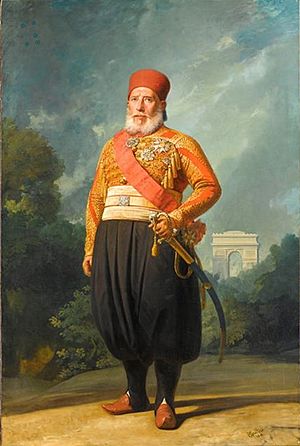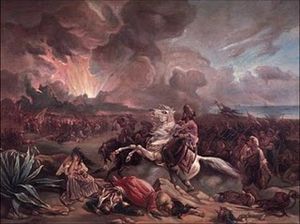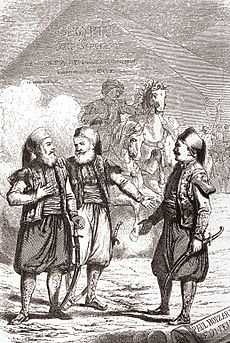Ibrahim Pasha of Egypt facts for kids
Quick facts for kids Ibrahim PashaKavalalı İbrahim Paşa إبراهيم باشا |
|
|---|---|
 |
|
| Wāli of Egypt, Sudan, Syria (incl. Palestine and Transjordan), Hejaz, Morea, Thasos, Crete |
|
| Reign | March 2, 1848 – November 10, 1848 |
| Predecessor | Muhammad Ali Pasha |
| Successor | Abbas I |
| Born | 1789 Kavala or Nusratlı, Drama, Rumelia Eyalet, Ottoman Empire |
| Died | 10 November 1848 (aged 58–59) Cairo, Egypt Eyalet, Ottoman Empire |
| Burial | November 10, 1848 (11 hours after his death) Hosh al-Basha Mausoleum of Imam al-Shafi'i, Cairo, Egypt |
| Wives |
|
| Issue |
|
| Arabic | إبراهيم باشا |
| Turkish | Kavalalı İbrahim Paşa |
| Dynasty | Muhammad Ali dynasty |
| Father | Muhammad Ali Pasha |
| Mother | Amina Hanim |
Ibrahim Pasha (born in 1789 – died November 10, 1848) was a famous general and ruler. He was the oldest son of Muhammad Ali, who was the ruler (called a Wāli) of Egypt and Sudan.
Ibrahim became a general in the Egyptian army when he was still a teenager. This army was created by his father. Towards the end of his life, he became the ruler of Egypt and Sudan. This happened because his father was very ill. His rule also included other areas his father had taken over. These were Syria, Hejaz, Morea, Thasos, and Crete.
Ibrahim died on November 10, 1848, only four months after becoming ruler. He passed away before his father did. When his father died the next year, Ibrahim's nephew, Abbas, became the next ruler of Egypt.
Ibrahim Pasha is remembered as one of the most important leaders of the Muhammad Ali dynasty. He is especially famous for his many military victories. He even defeated the powerful Ottoman Empire several times. Today, a statue of Ibrahim Pasha stands in Cairo, the capital of Egypt.
Contents
Early Life and Beginnings
Ibrahim Pasha was born in 1789 in a village called Nusratli. This village was near Drama, in what is now Greece. His mother was Emine, and his father was Muhammad Ali.
In 1805, when Ibrahim was just 16, his father was trying to become the ruler of Egypt. Ibrahim was sent away as a hostage to an Ottoman official. However, he was allowed to return to Egypt after his father became the official ruler. His father also managed to defeat a British army that tried to invade Egypt.
In 1813, Muhammad Ali went to Arabia to fight a war. Ibrahim was left in charge of Upper Egypt. He continued to fight against the remaining power of the Mameluks and defeated them. In 1816, he took over command of the Egyptian army in Arabia from his brother, Tusun Pasha.
Campaigns in Arabia
Ibrahim's father, Muhammad Ali, had started training his army in European ways. Ibrahim likely received some of this training. His first major military campaign was in Arabia. This war lasted two years. It ended with the defeat of the House of Saud, a powerful group in the region.
Muhammad Ali's army landed in Yanbu in 1813. The holy cities of Islam had been taken back from the Saudis. Ibrahim's job was to follow them into the desert and destroy their strongholds. The Egyptian troops had better training and artillery. This gave them an advantage in open battles.
However, crossing the vast desert to reach the Saudi capital, Diriyah, was very difficult. Ibrahim showed great energy and never gave up. He shared all the hardships with his soldiers. By September 1818, he forced the Saudi leader to surrender. He then captured and took over Diriyah.
Battles in Greece


After his success in Arabia, Ibrahim returned to Cairo in triumph in 1819. He strongly supported Colonel Sève, a French officer. Sève was training the Egyptian army using European methods. Ibrahim even trained like a new soldier himself to set an example.
In 1824, the Ottoman Sultan Mahmud II asked Muhammad Ali for help. The Sultan needed the well-trained Egyptian army to fight against the Greek Revolution. The Greeks were fighting for their freedom, and the Sultan's own forces had not been able to stop them.
Ibrahim was sent to the Morea (now the Peloponnese in Greece) with an army of 17,000 soldiers. They sailed in July 1824. At first, they had trouble landing because the Greeks used special "fire ships" to attack them. But when the Greek sailors had problems with their pay, Ibrahim was able to land in February 1825.
He stayed in the Morea until October 1828. He defeated the Greeks in open battles. He also captured the city of Missolonghi in April 1826, though it was a difficult fight. However, he was defeated three times in the Mani region. Greek fighters used guerrilla tactics, hiding and attacking his army. In return, Ibrahim's army destroyed the countryside and forced many people to leave their homes and work elsewhere.
These harsh actions made people in Europe very angry. This led to the navies of the United Kingdom, France, and Russia stepping in. They fought against the Ottoman and Egyptian fleets in the Battle of Navarino in October 1827. The European forces won. After this, a French army landed in Greece. By October 1828, Ibrahim was forced to leave the country.
Campaigns in Syria
In 1831, Ibrahim's father had a major disagreement with the Ottoman government (called the Porte). Ibrahim was sent to conquer Syria. He captured the city of Acre in May 1832 after a tough fight. He then took over Damascus.
Ibrahim's army defeated an Ottoman army at Homs in July. They won another battle at Beilan in July. Then, they moved into Asia Minor (modern-day Turkey). Finally, they completely defeated the Ottoman chief minister (called the Grand Vizier) at Konya in December 1832.
A peace agreement in May 1833 left Syria under Muhammad Ali's control for a while. Ibrahim stayed in Syria as governor. He tried to rule well, but his father made him collect a lot of taxes. This made the people unhappy and led to revolts.
In 1838, the Ottoman government felt strong enough to fight again. War broke out once more. Ibrahim won his last major victory for his father at Nezib in June 1839. However, the United Kingdom and Austria stepped in. They wanted to keep the Ottoman Empire strong. Their navies cut off Ibrahim's supplies from Egypt by sea. A large revolt in Syria also cut him off. He was finally forced to leave Syria in February 1841.
The people of Karak, a city in Transjordan, got their revenge on Ibrahim Pasha. In 1841, as Ibrahim and his army were leaving Damascus, they were attacked constantly. By the time Ibrahim reached Gaza, he had lost most of his army, weapons, and animals.
Final Years
Ibrahim Pasha spent his last years in peace. However, his health was not good. In 1846, he visited Western Europe. He was welcomed with respect and a lot of interest.
When his father became very old and unwell, Ibrahim was chosen to rule in his place. He was a temporary ruler (called a Regent) from July 1848 until his death on November 10, 1848.
Honours
- Order of Glory of Turkey-1817
- Knight of the Order of Saint Joseph of Tuscany-1845
- Grand Cross of the Legion d'Honneur of France-1845
- Grand Cross of the Order of the Tower and Sword (GCTE) of Portugal-1846
See also
 In Spanish: Ibrahim Bajá para niños
In Spanish: Ibrahim Bajá para niños
 | William M. Jackson |
 | Juan E. Gilbert |
 | Neil deGrasse Tyson |

